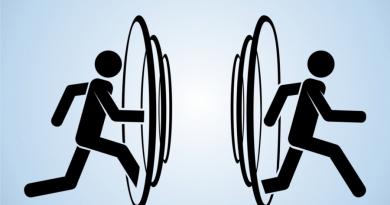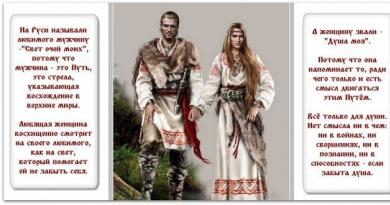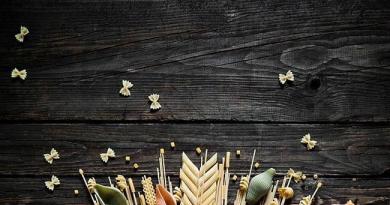Stork
Stork, long-legged stork,
Show me the way home.
Stomp your right foot
Stomp your left foot
Again with the right foot,
Again with the left foot.
After - with the right foot,
Then - with your left foot.
Then you'll come home!
(I. Tokmakova)
Squirrel
Squirrel sitting on a cart
She sells nuts
To my little fox sister,
Sparrow, titmouse,
To the fat-fifted bear,
A mustachioed bunny.
***
The squirrel jumps on the branches,
Tearing nuts for his kids.
The little squirrels sleep in her hollow,
Everyone in their own crib.
(N. Mayer, “Forest laughs”)
Ladybug
Ladybug,
Fly upward deftly
Bring us from heaven:
New bread
Change for mushrooms
The berries are growing,
Radish has a long tail.
(folk nursery rhyme)
Baffle
The boletus lies
In a puddle across.
Round back,
White bristles,
Crochet tail,
Stigma with a snout.
(folk nursery rhyme)
***
The chick can't see the sun,
The stigma cannot be raised to the sky.
The pig is looking for the sun in a puddle,
There it is no worse!
(V. Berestov)
Jackdaw
- Jackdaws, crows,
Are you all healthy?
- One jackdaw is not healthy.
I pricked my leg.
We'll go to Torzhok,
Let's buy the jackdaw a boot.
(folk nursery rhyme)
Porcupine
carries needles with him.
He won't ask anyone.
Why do they all at once?
Need a porcupine?
(E. Moshkovskaya “Zoo”)
Woodpecker
The woodpecker caulked his house.
I spent the whole day on this:
- Nowadays I have no time for fun,
Tomorrow - everyone's housewarming party!
(N. Mayer, “Forest laughs”)
Hedgehog
The prickly hedgehog was in a hurry
For lunch and - got lost!
I barely climbed onto the hummock:
-That’s my house, near the spruce tree!
(N. Mayer, “Forest laughs”)
***
Grandfather Hedgehog,
Don't go to the shore:
The snow melted there
Floods the meadow.
You'll get your feet wet
Red boots!
(folk nursery rhyme)
***
Fuck-fuck-gobble,
A mouse rides on hedgehogs.
Wait, prickly hedgehog,
I can't bear to go any more,
You're very prickly, hedgehog!
(folk nursery rhyme)
Raccoon
Raccoon... he washes food
So that the food becomes cleaner.
Wash it properly
And then he has lunch.
(E. Moshkovskaya “Zoo”)
Cranes
Oh, lyuli-lyuli-lyuli!
The cranes have arrived
cranes are hairy legs
We didn't find a way.
They sat on the gate
And the gate is creaking and creaking...
Don't wake up Vanya with us,
Vanya is sleeping and sleeping with us.
(folk nursery rhyme)
Bunnies
The bunnies came out to the meadow,
We stood in a small circle
One two three four five
Let's knock our paws.
Knocked, knocked
And tired....
We sat down to rest.
***
Bunny sits under a bush
On a stump and trembling:
A fox prowls through the forest
And looking for a hare through binoculars
(N. Mayer, “Forest laughs”)
***
- Stop, little bunny, don’t run.
Along the narrow path,
You better save it
Its tail is short.
The fox sneaks along the path.
It's unlikely he's looking for mushrooms!
(I. Tokmakova)
***
Bainki, bainki,
The bunnies came running,
Sat down on the bench
They asked for a watering can
Watered the garden
Where does cabbage grow?
(I. Tokmakova)
***
In winter the little bunny is white,
Gray in summer,
Short-tailed, oblique,
He bypasses everyone.
Steals carrots
Spends the night under a bush
(folk nursery rhyme)
Porridge
Come on, come on, come on, come on!
Don't grumble, pots!
Don't grumble, don't hiss,
Cook sweet porridge,
Cook sweet porridge,
Feed our children.
(I. Tokmakova)
Strawberry
The titmouse screams high:
“Oh, how the strawberry has grown!
We need to pick it up quickly -
I flew to call the kids!”
(K. Avdeenko)
Goat
Horned cape,
butted goat
She ran away behind the fence,
I danced all day.
Legged goat
Top-top!
Goat eyes
Clap clap!
(folk nursery rhyme)
Goat
Like we have a goat
What a smart guy he was:
I walked on water myself,
I cooked the porridge myself,
He fed grandpa and grandma.
(folk nursery rhyme)
Goat
I'll tie the goat
To the white birch tree,
I'll tie the horned one
To the white birch tree:
- Stop, my goat,
Stop, don't butt heads!
White birch,
Stop, don't swing!
(folk nursery rhyme)
Komarik
A mosquito sat under a bush,
On a spruce tree on a stump,
He dangled his feet on the sand,
He put his nose under the leaf -
Hidden!
(folk nursery rhyme)
Cat
Along the path, along the path
A little cat is walking
In little paws
I hid the scratches.
If you suddenly want -
The claws will sharpen.
Scratch-scratch!
***
We bought the cat
Boots for the holiday
They combed her mustache,
We sewed new panties.
But how to put them on?
There's nowhere to put the tail!
(folk nursery rhyme)
***
Pussy crying in the hallway.
She has great grief:
Evil people poor pussy
They don't let you steal sausages!
(B. Zakhoder)
Cat
The cat went to market,
The cat bought a pie
The cat went to the street,
The cat bought a bun.
Do you have it yourself?
Or demolish Borenka?
I'll bite myself
Yes, I’ll demolish Borenka too.
(folk nursery rhyme)
***
The cat is walking on the bench,
Leads the cat by the paws:
Tops, tops on the bench!
Tack on your paws!
(folk nursery rhyme)
***
Kitty, kitty-cat,
kitty - gray tail!
Come, cat, spend the night,
Rock my baby
To lull.
(folk nursery rhyme)
Cow
Little cow, little cow,
Horny little head!
Don't butt small children
Better give them some milk!
(V. Berestov)
Crocodile
-Why are you so green, crocodile?
You must have swallowed a frog?
-If I tell you the truth -
I don't have time to mature!
(V. Orlov)
Swan
A swan floats along the river,
Above the bank the little head is carried.
He waves his white wing,
He shakes some water onto the flowers.
(folk nursery rhyme)
Chanterelle
Four little fox sisters
We found mittens on a tree stump,
But they didn’t decide how to divide
And they gave them to the bunny.
(N. Mayer, “Forest laughs”)
Buttercup
- Buttercup, Buttercup, what do you want?
- Yes, you tickle me,
So you tickle the leaves for me,
Whatever you want, you want!
(I. Tokmakova)
Bear
Trampling bear,
Scatter the clouds.
Scatter the clouds -
I'll give you a bunch of oats.
Disperse the fog -
I'll give you a blush pie.
(folk nursery rhyme)
***
- Bear, bear! What happened to you?
Why do you sleep in winter?
-Because snow and ice -
not raspberries and not honey!
(V. Orlov)
Carrot
In the garden there is noise, noise, noise,
Bunny-bunny: crunch-crunch-crunch,
Jump-jump-jump on the stumps, on the stumps,
I ate a carrot - yum-yum-yum!
(K. Avdeenko)
Mouse
In a mink there is a mouse on a feather bed
Sleeping in a straw basket:
On the pillow there is a mustachioed muzzle,
Warm striped pajamas
(N. Mayer, “Forest laughs”)
***
The mice dance in circles
The cat is dozing on the bed.
Hush, mice, don't make noise,
Don't wake up Vaska the cat.
Vaska the cat will wake up,
It will break up the whole round dance.
(folk nursery rhyme)
frogs
Whose screams and ponds are there?
-Kvass, kvass for us here!
Kva-kva-kvasu, just-kva-shi,
We're tired of water!
(I. Tokmakova)
Meat
We're walking, we're walking!
Let's take a walk and see
Let's work up an appetite
Let's eat delicious meat.
(K. Avdeenko)
Rhinoceros
Rhino doesn't have it
No mug.
- I will have a little face,
I only have 3 more days!
(E. Moshkovskaya “Zoo”)
Cucumber
Cucumber, cucumber!
Don't go to that end -
There's a mouse living there
He'll bite your tail off!
(folk nursery rhyme)
Peacock
At the cheerful peacock
A basket full of fruit.
The peacock is waiting for friends to visit,
In the meantime, the peacock is alone.
Cockerel
Cockerel, cockerel,
golden comb,
Oil head,
Silk beard!
That you get up early
Sing loudly
Don't you let Vanya sleep?
(folk nursery rhyme)
***
A cockerel sits on the fence
Screams at the top of his lungs -
The boss is not great,
And he doesn’t tell me to sleep for a long time.
Raises everyone in time,
Even though he doesn’t know the clock.
(folk nursery rhyme)
***
Cockerel, cockerel,
Give me a comb
Well, please, please!
I'll comb my curls.
(G. Lagzdyn)
***
-Well, Petya the cockerel!-
The pigs were surprised.
- Why are you a comb
Do you wear it on top of your head?
The rooster says in response:
-I don't have pockets!
(V. Orlov)
Train
Chug-chug, chug-chug,
The train is rushing at full speed,
The locomotive is chugging.
“I’m in a hurry,” it buzzes, “
I'm in a hurry
I'm in a hurry
I'm in a hurry!
(E. Moshkovskaya)
Hide and seek
Sun and cloud again
They started playing with hair.
Only the sun will hide -
The cloud will burst into tears.
How can the sun be found?
The rainbow is laughing in the sky!
(V. Berestov)
Birdie
A bird sat on the window,
Stay with us for a while.
Wait, don't fly away!
Flew away... ah!
Pock
-You, rowan
Curly,
When did you get up?
When did you grow up?
- I rose in the spring,
I grew up in the summer
Bloomed in the dawn,
Ripened by the sun.
(folk nursery rhyme)
Firefly
Green firefly bug,
He lit his bright flashlight.
Like a sparkle flies in the sky
And at night it lights the way for everyone.
(N. Mayer, “Forest laughs”)
Dog
-Why is the dog angry?
Does he walk around wagging his tail?
- Is that how the tail is trained?
Is it screwed on badly?
(V. Orlov)
Cottage cheese
Cottage cheese, cottage cheese, cottage cheese,
Yum-yum-yum - how delicious!
Cottage cheese, cottage cheese, cottage cheese,
White like cabbage!
In your mouth! - and cottage cheese
Like a snowflake melts;
Cottage cheese cottage cheese is our friend!
Strengthens teeth.
(K. Avdeenko)
Tigress
The tigress washes herself,
And the cubs wash their faces.
Dad washes his ears
And the washcloth is a paw.
(E. Moshkovskaya “Zoo”)
Turtle
Turtle, turtle
Lives in a shell -
Sticks his head out
It will be removed back.
***
-Why do you, turtles,
Squares on a shirt?
- To play chess and checkers
The turtles were playing!
(V. Orlov)
Snails
-Why don’t they come out?
From the snail's house?
- Not in their house
No doors, no gate.
(V. Orlov)
***
Our ducks in the morning -
Quack-quack-quack! Quack-quack-quack!
Our geese by the pond -
Ha-ha-ha! Ha-ha-ha!
And the turkey in the yard
Ball-ball! Balda-Balda!
Our little walks are at the top -
Gru-gru-gru! Gru-gru-gru!
Our chickens through the window -
Ko-ko-ko! Ko-ko-ko!
What about Petya the Cockerel?
Early, early in the morning
He sings to us ku-ka-re-ku!
(A. Barto)
Owl
At night an owl flew through the forest,
I was looking for an owl with a flashlight,
And the eagle owl is sitting on an oak tree,
He shouted to her: “Fu-boo, fu-boo!”
(N. Mayer, “Forest laughs”)
***
Look at the little owls -
The little ones are sitting next to each other.
When they are not sleeping, they eat.
They don't sleep when they eat.
(S. Marshak)
***
This is an owl. During the day he sleeps.
He looks tired.
I don’t want to sleep at night -
At night he hunts!...
(E. Moshkovskaya “Zoo”)
Soup
Deep, not shallow
Ships in saucers:
onion head,
red carrot,
Parsley, Potato
And a little grains.
Here the boat is sailing,
Swims right into your mouth!
(I. Tokmakova)
Hamster
The red hamster stuffed his cheeks,
I ran home, opened the doors, -
But he can’t enter!
Who will help him now?
(N. Mayer, “Forest laughs”)
Piggies
Piggy pigs are unhappy:
“Oink-oink-oink!” they shout and shout.
- We don’t want noses like that!
Only two holes stick out.
(K. Avdeenko)
Cheeks-Cheeks
Cheeks, cheeks, cheeks,
Dimples, lumps;
All day until night
Smile your cheeks!
(K. Avdeenko)
Yula
The dolls dance the old waltz,
Couple spins after couple,
And Yula, Yula, Yula,
I never found a pair.
Who will make friends with Yula,
He will be completely dizzy.
(V. Berestov)
Learning poems by heart with children preschool age- this is one of the directions in the development of the mind, morality, and aesthetic perception of poetry. Poems influence the child with the power of images, elasticity of rhythm, melody, and carry him into the land of sounds.
Tasks and classification of learning methods
When children study poetry, it is necessary to achieve the following tasks:
- revive the child’s attention and interest in the work;
- cause a desire to remember it;
- help in understanding difficult moments;
- provide memory support;
- teach your child expressive recitation.
There are several methods for memorizing poems according to the type of perception, their description is in the table.
Method name What means are used
Visual method Visual aids are used: pictures, children's drawings, mnemonic tables, toys.
Auditory method Auditory-speech reliance on rhyme, repeated repetition of verse, recall, intonation expressiveness.
Motor method Accompanying learning with movements, gestures, facial expressions, and the use of finger games.
Boolean method Retelling the rhyme in your own words, when retelling it again, including the author’s words, explaining phraseological phrases that are difficult to understand.
Ways to learn poems with children of different ages have distinctive features. Let's look at the detailed methodology.
On average, a child of this age is able to learn 2-3 rhymes per month. More developed children can learn more. Children at 2 years old quickly learn rhymes with a large number of nouns and verbs, with specific images and dynamic development.
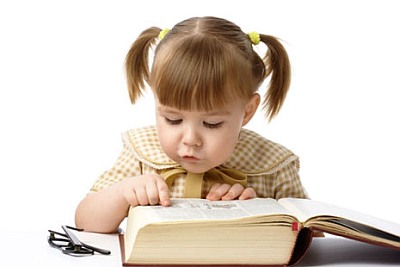
The rules for choosing rhymes for children of this age group are as follows:
- small volume of verse and short lines;
- simple and clear rhythm;
- simple and understandable images for the baby;
- lack of descriptions and contemplation;
- bright dynamic action.
Listening to the sound of poems, children should easily imagine their content in the form of a picture-image. These can be poems about toys, children, animals that are clear in meaning, simple and accessible to children. They are no more than a quatrain in size, with a cheerful, dancing rhythm, clear, memorable rhymes and the presence of playful actions.
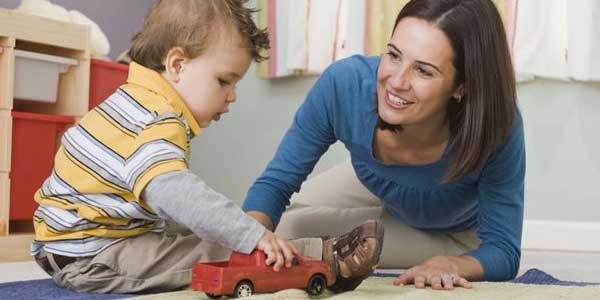
All these features make the memorization process much easier for kids, the small volume of poems is not difficult to repeat many times, acting out the actions adds interest and attracts the attention of a two-year-old child.
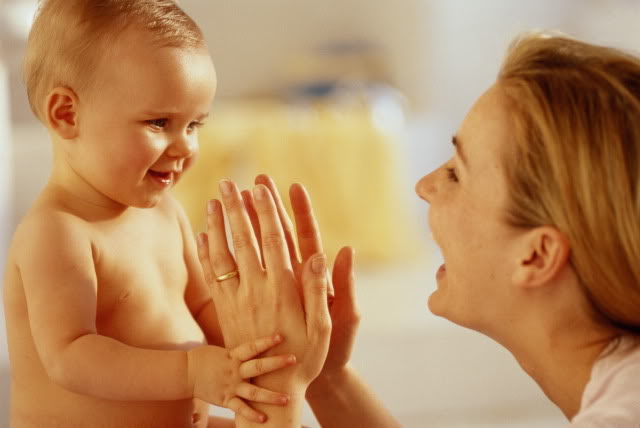
All these properties have folk jokes: “Ladushki-ladushki”, “Magpie-white-sided”, “Cat’s House”, “Geese-geese” and many others. In form, language and content, they meet the criteria for poetry for children of this age.
In addition to selection by psychological characteristics the age of the child, there is also selection according to the type of emotionality. That is, the poem must correspond to the child’s temperament type.
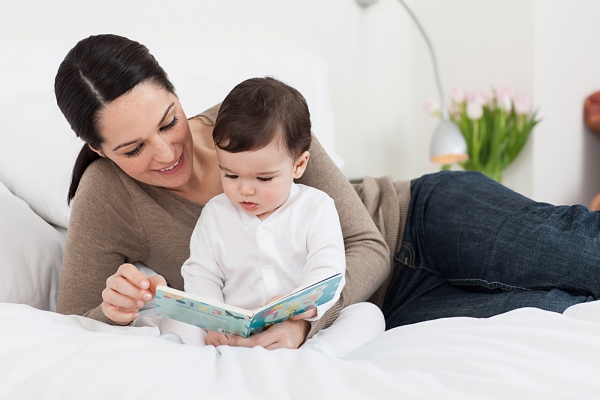
For example, poems with a cheerful rhythm are suitable for active children to memorize, while leisurely, smooth quatrains are suitable for children of a calm temperament. And the more modest ones will enjoy being in the place of the main character of the poem, hearing how their own name is pronounced by other children.
Particular attention should be paid to a child who does not perceive rhyme and syllable well. At an older age, this feature of his is unlikely to be taken into account. Therefore, at an early stage of development, it is necessary to help the baby with a careful selection of rhymes that will evoke an emotional response in him.
The sequence of learning rhymes with kids
The process of memorizing poetry is not easy: the teacher must have a good understanding of what abilities the child has. One learns everything quickly and firmly, another slowly and forgets quickly, the third child needs to say the rhyme out loud.
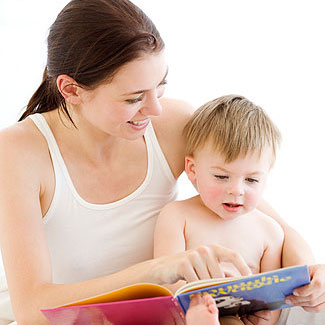
The method of memorizing poetry is similar to learning to retell; the child also learns to reproduce the text he has heard. The learning sequence is as follows.
- Preparatory conversation with the child, setting up the perception of the poetic word. In it, you need to touch on the child’s emotional-figurative memory: consider a toy, a drawing, an object that is in tune with the theme of the poems.
- Next, recite the verse expressively, repeating it 4-5 times and explaining its meaning in general and individual passages that are difficult to understand.
- Then the children are asked to repeat the entire quatrain, with the more capable child doing this first. In order for children to express their individuality, it is necessary to exclude the recitation of poems in chorus.
- At the next stage of the lesson, the rhyme is repeated by the child with weaker memory. The teacher can suggest words, encourage the child with gestures and words, and allows other children to finish the line.
- It is difficult for kids of this age to sit still in one place for a long time, so reading the poem should be accompanied by playful action. For example, a child rocks a doll to the words of a lullaby, imitates riding a horse to a poem about a horse, the verse “Flag” can be accompanied by movement with flags.
- To prevent children from getting bored with repeated repetition, play moments should be used. For example, invite one child to stand behind a screen and guess who is reading the rhyme, or ask the child to help learn a nursery rhyme for the unlucky Parsley.
- At the end of the lesson, it is better to call on the child to expressively read the poem. To maintain children's attention, it is suggested to tell the newly learned rhyme to their favorite toy: a bunny, a bear, a doll.
- The learned quatrains can be read in family or children's party, this will be the final stage in learning the poem.
Video poems of classics from 2 years old
It has been noticed that children remember the verse after 8-10 repetitions, but in different classes, and the form of repetition should change. You can read the poem role-playing, invite children to use it in a game, or read it at a party.
Techniques and means of random memorization of rhymes
Psychologists distinguish between voluntary and involuntary methods of memorization. Non-voluntary memorization occurs without the child’s willpower, during play or activities aimed at other goals. The voluntary method requires a certain mental work of the baby.
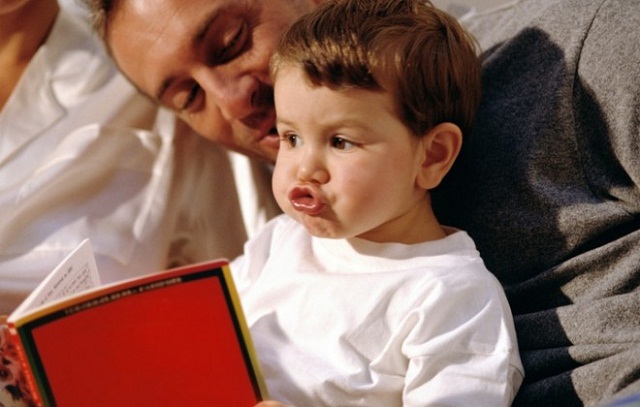
This needs to be taught because two year old child does not yet know how to make an effort to remember. To do this, the technique of repetition and recall is used.
1. Repetition. To learn a nursery rhyme, the child is asked to turn to the sun with the words: “Sunny, sweet, look through the window!” First, the adult says the nursery rhyme, then invites the child to repeat it. You must definitely encourage your child with the words: “How quickly you memorized the poem!”
2. Recall. Next time you can ask the child: “Let’s remember what we called the sun?” If the child remembers, be sure to praise him; if he finds it difficult, suggest words.
Video - how to learn poetry correctly. Poems with movement.
To develop repetition and recall skills in young children, it is necessary to always reward their efforts. After all, sometimes it happens that children do not want to repeat and memorize poems. The following tools are used to activate these skills:
- the poem must have an emotional response in children, they must like it, its characters must fall in love so that children look forward to meeting it with joy;
- Emotional empathy with the teacher can motivate children to complete his task in order to please him and gain approval from him.
To create such an atmosphere, read poetry expressively, conveying your true feelings, place children in absolute trust, showing a friendly, fair attitude towards them. Children, especially shy and timid ones, need the teacher's sincere interest in their successful development. They need the conviction that they will succeed, which is conveyed to them by an adult.
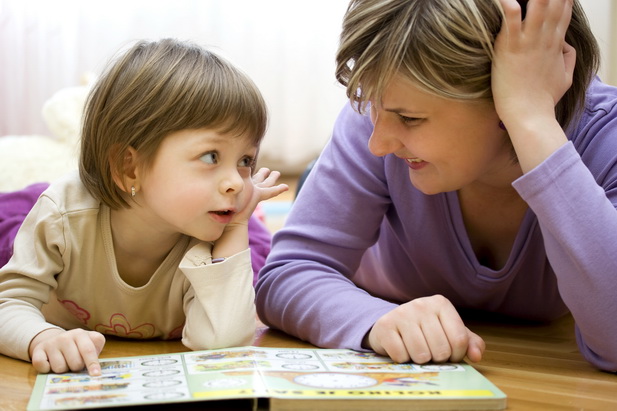
In a rhyme, a child is always attracted by melody and rhythm; often only this fact makes him try to remember his favorite rhyme. In order for the child to be able to see the connection between life phenomena and the words of the poem, you need to point this out to him.
Warm rain begins, and the teacher, together with the kids, joyfully says: “Rain, rain, drip and drip, don’t drip like that often!”
The wind blew and swayed the branches of the trees, draw the children’s attention to this by reading the poem with them: “The wind blows in our faces, the tree swayed.” Poem for better memorization can be accompanied by hand movements.
It is preferable to memorize poems in good positive mood. It happens that a child simply feels good from the kind attentiveness of an adult. The poem memorized at this moment becomes an “anchor” of a wonderful mood and will be etched in the baby’s memory for a long time.
Learning poetry using mnemonic tables and finger games
Mnemonic tables are an excellent aid in memorizing poetry. With their help, children use visual memory to memorize and can consistently recite a poem, relying on pictures - clues.
It’s even more interesting when the pictures are drawn right in front of the children, the content of the rhyme comes to life. Older children can take part in coloring pictures or creating their own poetic images. Here are examples of successful mnemonic tables:
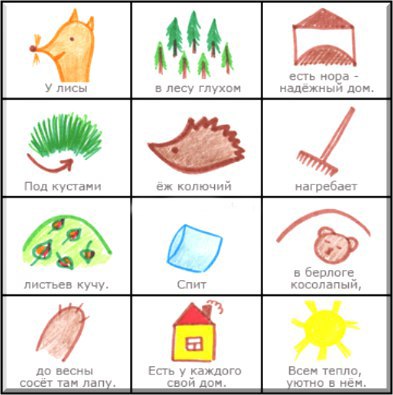
Poems for children small small less
Today on the Internet on children's sites you can special labor find poems small small small for the smallest children,very short and easy to remember. Memorizing poems from memory in childhood is not only a teaching moment, but also an educational one. Parents and teachers know that learn poetry- it is very important. This broadens the child’s horizons, teaches him to perceive poetry, develops speech and shapes the culture of the little person. Especially in this way, memory develops and trains, that is, a small child develops by memorizing simple poems, smaller than small, small, consisting of two or three short sentences.
You need to memorize a poem expressively. That's just how a child is made. If all this is done without feelings and emotions, the poem will seem nonsense to the baby. By the way, some kindergarten teachers do not particularly care about expressive reading. After all, there are a lot of children in the group. Collective learning turns into monotonous sound. This is the wrong approach.
It will be of little use. You need to learn poetry individually. If a child is not imbued with poetic beauty from childhood, then when he grows up, he is unlikely to be interested in poetry. We have prepared for your little children very short and simple poems small small less, characterizing certain properties of objects and in an accessible form describing the rules of behavior necessary for the development of a child.
The poetic motif is perceived from infancy, so you need to start working with children as early as possible. Children listen to poetry with great pleasure. They perceive them much easier than prose.
Most children's authors write their works in poetry. Unlike prose, poetry does not tire and is deposited in the subconscious. Since children remember poems very easily, parents should take this into account. Poems improve memory, and therefore increase the child’s overall level of learning. A good memory will help you learn the material you have learned more easily at school. The sooner you and your child start learning poetry, the easier it will be for him to remember formulas in school lessons.
To make the poem easier to remember, it must correspond to the age of the baby. Don't force small child learn poetry for adults. It would be much better to use children's classic works written by Mikhalkov, Barto, Chukovsky.
You also need to pay attention to the child’s temperament. It is better for active children to choose rhythmic, cheerful poems, and for calm, slow children - smooth ones. Of course, at school there will no longer be such distinctions, but for now, at the beginning, it is worth acting this way. You will find different options for short poems for children, small or small, at the end of the article.
It will be better learn poetry not just like that, but for one of our relatives and friends. For example, as a gift for mom, dad, grandma, grandpa. And only at seven or eight years old should the child be gradually taught that poetry needs to be learned for himself.
The best poems for little children to memorize. Make sure your child tries to read poetry with expression.
Next article:
Cockerel
Cockerel, Cockerel, golden comb.
Cockerel, Cockerel, golden comb
Butterhead, silk beard
Why do you get up so early, sing loudly,
Don't you let the kids sleep?
Like our cat
Like our cat’s fur coat is very good,
Like a cat's mustache of amazing beauty,
Bold eyes, white teeth.
Cucumber, cucumber, don't go...
Cucumber, cucumber, don’t go to that end -
A mouse lives there and will bite your tail off!
“There are three chickens on the street...”
There are three chickens on the street
Fighting with a rooster
Three girls in the window
They look and laugh:
“Shoo-shoo! Ha ha ha!
Have pity on the rooster!
“The wind walks across the sea...” (from “The Tale of Tsar Saltan...”)
The wind blows across the sea
And the boat speeds up;
He runs in the waves
With sails raised...
ATTACHMENT
Why does mommy have two dimples on her cheeks?
- Why does a cat have legs instead of arms?
- Why don’t chocolates grow on the crib?
- Why does the nanny have hair in sour cream?
- Why don’t the birds have mittens?
- Why do frogs sleep without a pillow?..
- Because my son has a mouth without a lock.
Christmas tree (abbr.)
If only the Christmas tree had legs,
She would run along the path.
She would dance with us,
She would have clicked her heels.
The toys would spin on the Christmas tree -
Multi-colored lanterns, firecrackers.
The nesting dolls on the Christmas tree would laugh
And they clapped their hands with joy.
bear
Dropped the teddy bear on the floor
They tore off the bear's paw.
I still won’t leave him -
Because he's good.
Ship
Sailor's hat, rope in hand,
I'm pulling a boat along a fast river.
And the frogs jump on my heels,
And they ask me: - Take it for a ride, captain!
Cockerels
The cockerels have fluttered,
But they didn’t dare to fight.
If you get too cocky,
You might lose your feathers.
If you lose your feathers,
There will be nothing to fuss about.
The cat inflated the balloon,
And the Kitten disturbed her:
The top came with a paw!
And the Cat's ball pops!
Where's my finger?
Masha put on her mitten.
- Oh, where am I going?
There is no finger, it’s gone,
I didn’t get to my little house!
Masha took off her mitten:
- Look, I found it!
You search, you search and you will find.
Hello, little finger!
How are you?
Herringbone
Christmas tree, Christmas tree, bright lights,
Blue beads, Christmas tree, jingle!
Let's stand under the Christmas tree in a friendly round dance.
Let's have a fun, fun New Year!
Our Christmas tree
Look through the crack of the door -
You will see our Christmas tree.
Our tree is tall
Reaches to the ceiling. –
And there are toys hanging on it -
From base to top...
... Who is this and where is it from?
Did he bring such a miracle to us?
What kind of day is it in our garden?
It's the first day of the year!
Dandelion
Wears a dandelion
Yellow sundress.
When he grows up, he will dress up
In a little white dress:
Light, airy,
Obedient to the wind.
I'm a hamster (yum-yum)
I eat grain (yum-yum)
I live there (yum-yum),
Where is it. (yum-yum)
-Hamster, hamster,
Show off your barrel!
-No, I won’t show you
I'm lying on it!
Geese, geese.
-Ha-ha-ha.
-Do you want to eat?
-Yes Yes Yes.
- So fly home.
-Gray wolf under the mountain.
Sharpens his teeth, drinks water,
He won't let us pass.
-Well, fly as you wish.
Just take care of your wings.
The chicken went out for a walk and nibbled some fresh grass.
And behind her are the boys, yellow chickens.
- Co-co-co, co-co-co, don’t go far.
Row with your paws, look for grains.
They ate a fat beetle, an earthworm.
We drank a full trough of water.
The old hare is mowing the hay, and the fox is raking it.
The fly carries hay to the cart, and the mosquito throws it
When they got to the hayloft, the fly from the cart screamed:
-I won’t go to the attic, I’ll fall from there,
If I break a leg, I'll be lame.
I was stung by a bee
I screamed: “How could you?”
Bee in response:
"How could you?
Pick my favorite flower.
After all, he was to me
Terribly needed -
I was saving it for dinner."
Like ours at the gate behind the mountain,
Once upon a time there was a sandwich with sausage.
So the sandwich decided to take a walk,
There will be ants lying on the grass.
And he lured me along for a walk
A red-cheeked bun.
And the tea cups are sad
Plates and forks clattered.
Sandwich madcap
Don't go out of the gate
And if you go, you will disappear,
You'll end up in Lena's mouth.
An animal came into the door
So hungry:
Ate a broom and a broom,
Ate the rug on the floor
And a picture on the wall
Curtain on the window
A certificate was snatched from the table
And off to the grass.
And the certificate was given to the booger,
Is that what kind of a goat she is
Can't answer.
Date and month
Signature and seal!
A bird sat in the meadow,
A cow crept up to her
Grabbed my leg -
Birdie be healthy!
Boda-boda-bolabada,
A toad lives by the swamp,
He sits with his eyes bulging,
Loudly, loudly says:
Kwak-kwak, kwak-kwak,
And I jump like this!
Frost fell on the meadows,
Pinches the geese's feet.
- Geese, geese! - Ha-ha-ha!
-Put on your slippers!
Put on your slippers
Take care of your paws!
A mushroom grew under the mountain,
Grandfather Arkhip saw the mushroom.
I began to pull it out of the moss,
Only the powerhouse is bad.
Grandfather Arkhip was exhausted.
Can you help me pull out the mushroom?
Once upon a time there were two cats -
Eight legs, two tails.
Got into a fight with each other
Gray cats.
They rose like a pipe
Gray tails.
They fought day and night
Shreds flew.
And left from the cats
Only the tips of the tails.
Asks for a pillow in the evening:
“Put me under your ear,”
I really want to, Anton,
see your new dream.
Invited to dinner
The insects were walking toward the Bark Beetle.
You won't be able to get through the labyrinth soon.
Three hundred and thirty corridors...
Everyone has come!.. And the bark beetle,
Without waiting, he ate lunch.
In the morning mom wakes us up -
The sun is pouring from the eyes.
And at the very bottom
My brother and I
Like grains.
A frog came to our house,
I scattered all the toys,
Looked around the mess
And she said quietly: “Quack...”
A goat walked along the bridge
And she wagged her tail.
Got caught on the railing
It landed right in the river.
Three cats met in a knitwear store
They sold gloves there, they came in different colors.
They approached the counter importantly and meowed protractedly:
- Do you have mouse color on sale or not???
Polka dot, pea, you're an acrobat!
How deftly you climb the rope!
The mustachioed pea immediately became arrogant.
- Yes, I would, - he says, got to the Sun
“Yes, I would,” he says, reaching the sky
“It’s a pity,” he says, the rope broke.
Among the wide and wild steppes,
The lonely burdock slept sweetly.
I slept and had wonderful dreams,
How he grabs someone's pants,
In the wolf's tail or hare's chest
And he will bravely set off on his journey.
Spruce on the edge - to the top of the sky -
They listen, remain silent, and look at their grandchildren.
And the grandchildren are Christmas trees, thin needles
A house was built under the porch -
Bast roof.
Who lives in that little house?
Well, of course, mice!
They bake from grain
Delicious flatbreads
And they take care of the mouse
From a neighbor's cat.
Ant, little ant,
Tell me, where is your little house?
- Near the stump under the old tree,
Where the needles lie in a mountain.
I've been living there for a year now
on the three hundredth floor!
The mosquito said:
- What a nightmare!
I suffer - I have no strength -
Someone bit me!
Ooty-ooti
Early, early in the morning
Mother duck came out
Teach the ducklings.
She teaches them, she teaches them!
- You're swimming, go away, go away,
Smoothly, in a row.
Although my son is not big,
Not great
Mom doesn't tell me to be a coward,
He doesn't order.
- Swim, swim,
Don't be afraid,
You won't drown.
A. Barto
Bathing
Oh, water off a duck's back -
I'm glad I'm thin!
Water is flowing
On the hands and face,
It pours and spills,
Bursts with laughter.
They will flow away with you, water,
Sickness and thinness.
T. Davydova
We won't go to bed early:
My daughter needs to be bathed.
Warm water
Let's pour on our bird.
Oh, water off a duck's back,
Alyonushka is thin!
Give me a diaper
Wrap Alyonka!
E. Blaginina
❧ You need to brush your baby now. And to make him like combing his hair, tell him a joke.
Grow, braid, to the waist,
Don't lose a hair.
Grow, little scarf, to your toes -
All the hairs are in a row.
Grow up, braid, don’t get confused -
Mom, daughter, listen!
While supporting your baby, let him jump on the sofa or crib.
Jumping gallop!
On the passerine
Increased
Ours has also grown up
On the passerine
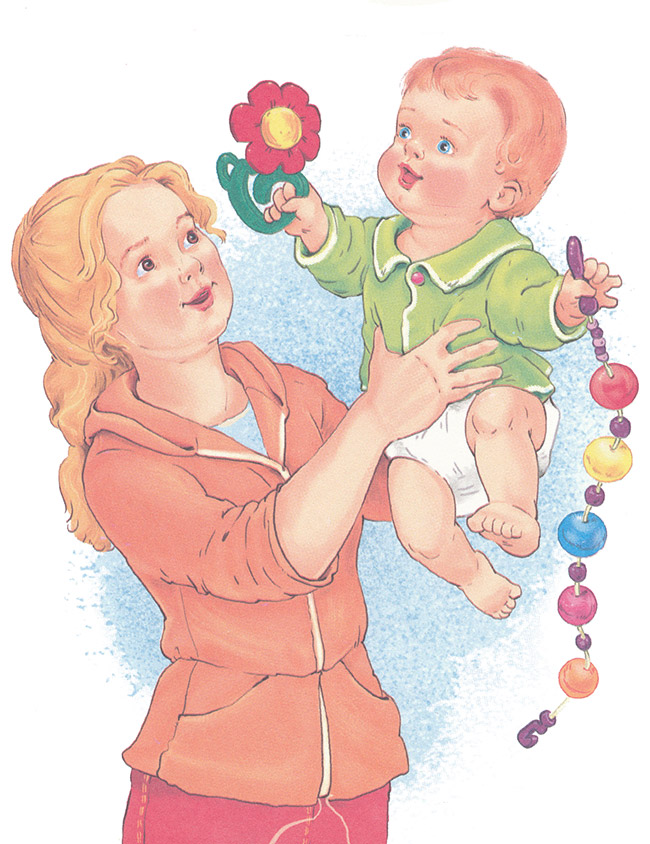
Jumping gallop!
Jumping gallop!
Grew up, grown up
Jumping gallop!
Jumping gallop!
Look,
How tall!
N. Pikuleva
Ladushki
Okay, okay,
We're going to visit grandma.
We're going to visit our grandfather,
For a dinner party.
We're riding a cat
Along a funny path.
We're riding on a dog
In a red car.
Grandma cooks for everyone
Ruddy pancakes.
T. Davydova
The baby sits on your lap, and together you clap your hands to the rhythm of the rhyme.
Talkers
❧ Your baby has already started talking. Don't believe me? And listen! After all, his first “agu” is the real first word. Talk to him. Show your baby the toy, tell him about it and play with him. And to make it easier for you to do this, we have selected poems.
Give me a word
Who walks with me
Ahu yes ahu?
He says, and I understand
Speak, my talker,
Give me a word
N. Pikuleva
Lisa, Lizonka, Lizok,
Well, say it again:
"Mother, father...
Ba-ba... de-da...”
Well, where are you going, fidget?
N. Pikuleva
First words
Everyone has their first words:
The frog has qua-qua-qua!
The pig has oink-oink-oink -
I give you a song!
The foal has a yoke! —
Running after mom is not easy.
The sparrow has a chirp-tweet! —
He's been used to this since childhood.
There are very sleepy words -
The sleeping grass sings them to us.
And all day I repeat the words:
T. Davydova
Present
Oh, lyuli-lyuli-lyuli!
They came to us with gifts:
Bunny with cabbage
And delicious carrots.
The whole deck
The bear is carrying honey.
Squirrel in a cart
We're bringing nuts.
Even the red fox
I brought chanterelle mushrooms.
And in the gift of the evil wolf
There is no point:
In the paws of the wolf it is empty.
We won't let him in!
T. Davydova
Conversation with mom
The son calls: “Aha, aha!” —
Like, stay with me.
And in response: - I can’t,
I'm washing the dishes.
But again: - Aha, aha! —
Heard with renewed vigor.
And in response: - I’m running, I’m running,
Don't be angry, my dear!
A. Barto
Beanbag
How big Andryushka is sitting
On the carpet in front of the porch.
He has a toy in his hands -
Rattle with a bell.
The boy looks - what a miracle?
The boy is very surprised
He won’t understand: where from?
Is this bell ringing?
A. Barto
Finger game
We move our finger over the baby's palm in a circular motion.
While the child is small, help him work with his fingers. When he grows up, he will learn to do it on his own.
Magpie Crow
Magpie Crow
I cooked porridge,
I jumped on the threshold,
Called guests.
There were no guests
Didn't eat porridge
All my porridge
Magpie Crow
I gave it to the kids.
We bend his fingers, as if counting
Gave this one
Gave this one
Gave this one
Gave this one
But she didn’t give it to this:
- Why didn’t you cut wood?
- Why didn’t you carry water?
Care
Leg - top,
Palm clap
Rattle - right in the forehead.
Step stepped -
He sat down on his butt, -
The child has a lot to do.
Karapuz conducts a conversation:
And also: “Agu, wa” -
That's the end of the words.
T. Davydova
Bon appetit
Is your child fussy at the table? Tell him these poems.
Boil, boil, porridge
Boil, boil, porridge,
In a blue cup
Cook quickly
Gurgle more fun!
Cook, porridge, sweet
From thick milk,
From thick milk
Yes, from semolina.
The one who eats the porridge
All your teeth will grow!
A. Rozhdestvenskaya
It's me. And this is a spoon.
Spoon the porridge a little at a time
I eat by myself.
I'm already big.
T. Davydova
A joke for lunch
Duck - duckling,
Cat - kitten,
Mouse - little mouse
They're calling for lunch.
The ducks have eaten
Cats have eaten
The mice have eaten
And you - not yet?
Where's your spoon?
Bon appetit!

